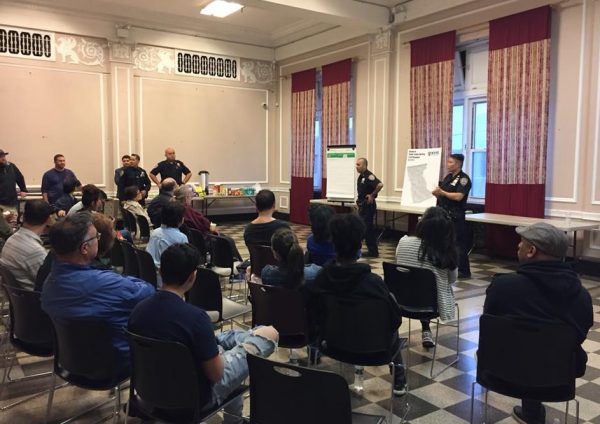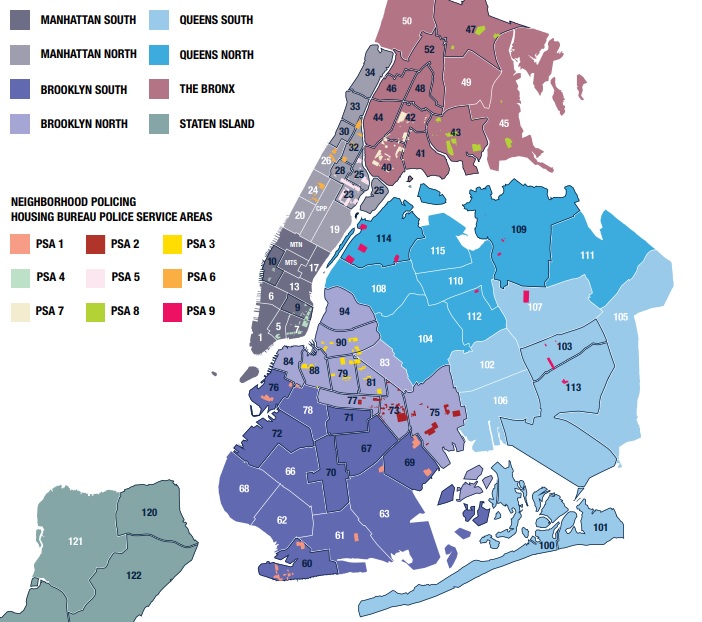
110 Precinct Meeting (NYPD)
Oct. 26, 2018 By Tara Law
The number of reported rapes has jumped by more than 50 percent in Queens North so far this year, an increase that is significantly higher than the rest of the city, according to NYPD data.
There have been 173 rapes reported in Queens North in 2018 as of Oct. 21, compared to 111 over the same period in 2017— an increase of 56 percent, also outpacing a 28 percent increase across New York City.
While the citywide rape rate has nearly halved over the past 25 years, the number of rapes reported in the eight precincts that make up Queens North has actually risen— by 5.5 percent.
Queens North, which includes the 108, 114, 112, 115, 104, 110, 111 and 109 precincts, covers western and central Queens as well as the northeast portion of the borough.
The 110 precinct, based in Elmhurst, has seen the number of rapes nearly double this year. There were 40 rapes in the precinct this year as of Oct. 21, compared to 21 for the same period last year.
Council Member Francisco Moya said in a statement that he found the rate in the 110 precinct and the 115— up 50 percent— to be “just staggering.” He wrote that he planned to reach out to both precincts to better understand the problem and to ask about prevention.
“I hope that what we’re seeing right now is an increase in victims coming forward to authorities to tell their stories and refusing to allow their attacker to slink away in silence,” Moya wrote.
This year’s increase reflects, in part, an uptick in rape reports across New York City.
The Police Commissioner and the mayor argue that the increase is actually positive, stating that it means more women are reporting rape spurred on by the #MeToo movement that began last year.
Captain Nicola Ventre, commander of the 110 precinct, declined to comment on the increase. Assistant Chief Juanita Holmes, who oversees the Queens North precincts, initially said that she would comment, but the NYPD’s public information office declined to give her permission to speak with a reporter.

NYPD: Queens North (Precincts: 114, 108, 115, 110, 112, 104, 109 and 111)
Deputy Inspector Osvaldo Nuñez, the commander of Astoria’s 114 precinct, said he believes part of the reason the rate has gone up in his precinct this year is that it was so low last year.
There were 32 rapes reported in the precinct as of Oct. 21, compared to 26 by the same date last year—an increase of 23.1 percent.
Nuñez said earlier this month that it can be particularly difficult to prevent rape because most victims know their assailant. About 80 percent of victims are raped by someone they know, according to the National Sexual Violence Resource Center.
“I try not to talk about rape at community meetings because then people think there’s a serial rapist on the loose,” Nuñez said. “When you hear this word, ‘rape,’ people think it’s where a stranger comes up to you in a dark alley. The majority of rapes are where the victim and assailant are known to each other.”
Maureen Curtis, who runs national victim services nonprofit Safe Horizon’s criminal justice programs, said that there has been a major shift over the last year, and women are much more inclined to come forward.
“People feel more comfortable coming forward,” said Curtis. “We’re more supportive, and less likely to blame a person for their own victimization.”
Curtis said that calls to Safe Horizon’s national sexual assault hotline went up by 500 percent the day after the Brett Kavanaugh hearings compared to the previous year.
Nevertheless, the majority of rapes that take place in the United States are not reported to the police, studies show. About 63 percent of cases are never reported, making rape the “most underreported crime,” according to the National Sexual Violence Resource Center.
Citywide, many of the rapes reported over the past year actually took place in previous years. The mayor said at an August press conference that in the early months of 2018, 30 percent of the rapes being reported had occurred in years past. The mayor did not say how many rapes reported in years past had been older crimes.
Both rape and domestic abuse survivors seem to be coming forward in greater numbers, according to Alpana Patel, a clinician who coordinates the Mount Sinai Sexual Assault and Violence Intervention Program.
“There’s definitely been an uptick,” said Patel, who has worked with domestic violence and rape survivors in the community for more than a decade. “There’s something in the air.”
Patel believes the #MeToo movement has led more women to report assaults.
The higher rate of rape reporting over the last few decades may also be driven by underserved groups— immigrants and non-English speakers —coming forward. In recent years, both the NYPD and nonprofits have made a concerted effort to encourage victims of these groups to reach out for help. This change has included increasing the availability of translation services and Know Your Rights training, Patel said.
However, Patel added that something seems to have shifted in the past year.
Patel said she has noticed that immigrant communities has been under greater pressure over the last year due to the Trump administration’s immigration crackdown, which may provoke some men to act out violently.
Both domestic violence and sexual assault are often about seizing power, Patel said.
“When they are feeling vulnerable, they think—’this is something I can control’,” Patel said.
Mayor de Blasio and Chief of Detectives Dermot Shea both addressed the city-wide increase in rape complaints at the City’s September crime briefing.
“I think that’s directly related to the conversation we’re finally having in our society,” de Blasio said. He emphasized that it is important for victims to continue coming forward.
Shea said the police department is shifting more personnel and funding to the Special Victims Unit, which addresses rape cases.
He added that the City is pursuing a “victim-centric model,” which includes giving victims the option to pursue prosecution— or not.
“For many— they want to report it, they want to get it off their chest, but sometimes a prosecution is not what’s sought,” Shea said.
To reach Safe Horizon’s sexual assault and rape hotline, please call 212-227-3000.






